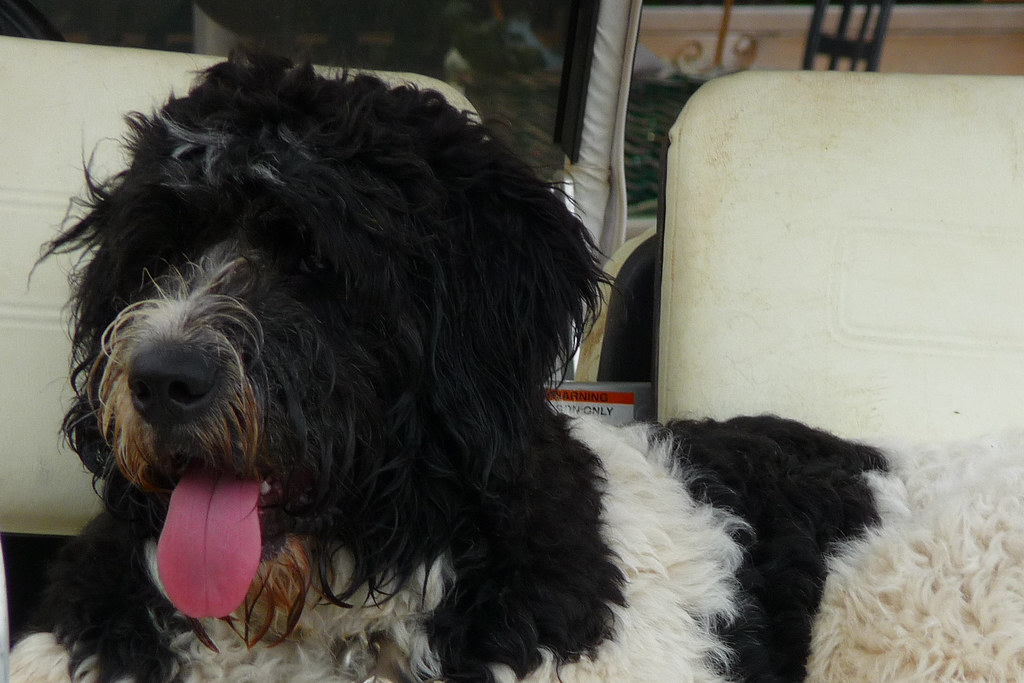If you are considering getting a St. Berdoodle puppy for yourself and need to know everything about the breed, you have just landed in the right place as this comprehensive guide contains everything about this giant Doodle.
Saint Berdoodle is one of the smartest and most affectionate hybrid breeds. It is a crossbreed of Saint Bernard and Poodle and inherits most of the traits from both the parent breeds.
It is a socio-friendly and intelligent breed with a low shedding coat which is why it is considered one of the ideal dog breeds for families with mild to aggressive allergies.
Table of Contents
Saint Berdoodle Quick Facts:
Name: Saint Berdoodle
Other names: St. Berdoodle
Origin: Unkown exactly but most likely in the US
Weight: Between 40 and 180 lbs
Height: 24 to 30 inches
Coat type: Short-haired coats
Hypoallergenic: Yes
Colors: Apricot, Blue, Cream, Brown, Cafe-au-lait, Gray, Silver, and White
Lifespan: 8 to 12 years
Exact origin and history of Saint Berdoodle
Saint Berdoodle’s exact history and origin are still unknown. It is widely said that this dog was first bred in the 1980s when Poodle was among the most popular breeds that breeders used for crossbreeding.
Let’s explore everything else about this lovely breed besides its history and origin.
Specialties:
Saint Berdoodle is a large-sized dog that is highly attractive, charming, loving, smart, social, and affectionate. Because of its intelligence, it can become a good service dog, therapy dog, or rescue dog.
Moreover, it can be an ideal companion for almost all types of owners and families. Along with that, Saint Berdoodle also does well with strangers, kids, other dog breeds, and non-canine pets such as cats.
Saint Berdoodle thrives in the company of its owners and prefers not to be left alone. If you’re a first-time owner, Saint Berdoodle could be an ideal choice for you.
Check the Best Dog Names
Body features and appearance:
Saint Berdoodles are giant dogs having teddy bear looks. As they are a product of Standard Poodle and Saint Bernard, they inherit most of their traits including coats, colors, intelligence, and behavior from both parents. If they inherit most of the traits from their Poodle parent, they may also have a hypoallergenic coat.
Temperament and behavior:
Saint Berdoodle develops a strong bond with his humans because both of his parent breeds are affectionate and well-tempered. It likes to be with its owners everywhere, be it’s kitchen, backyard, or the bathroom. Its patience is exceptional which is why it does well with other pets and children (the only problem is its size). It is intelligent and loves to explore new things.
Maintenance and grooming:
Coat: It totally depends upon the coat that it inherits from parent breeds. Usually, brushing its coat once a week will help maintain it. If not brushed regularly, the coat will develop tangles which can further lead to other problems.
Eyes and ears: As they are prone to several diseases, it is recommended to check their eyes and ears regularly to avoid any such issues. If you witness a foreign object or any physical change in the pup’s eyes and ears, visit your vet ASAP.
Teeth: Brushing their teeth twice or thrice weekly is enough to ensure their dental and oral health. The best practice for that purpose is to brush your pup’s teeth from an early age so it will not give you a tough time in adulthood.
Activities and exercise:
Daily walks and exercise are a must to maintain their overall health or they may develop behavioral issues such as tail chasing, destructive chewing, accessive barking, or separation anxiety. Along with that, trips to the dog parks, playtimes with family, and other agility activities are also recommended.
Cycling, running, or swimming is not recommended because they do not have that much energy. Overall, Saint Berdoodle is a less active breed that needs moderate exercise.
Training:
Saint Berdoodles are very intelligent so it is easy to train them as compared to other similar breeds. Little naps during the training sessions and other activities are recommended. Early socialization and obedience training is a must. while rewards during the training sessions are also helpful.
St. Berdoodle Pros and Cons:
It is really important to get to know about the pros and cons of the breed you are planning to get because it helps you to maintain and raise your dog as per the standards. So, let’s find the pros first.
Pros:
Ideal Family Dog:
Despite its large size, a Saint Berdoodle is a very friendly and joyous dog. With its wonderful behavior and looks, it instantly attracts everyone and makes friends with them.
Children-friendly:
Saint Berdoodle loves to stay around children and you don’t need to worry about their safety. But it is better to keep an eye on small children, especially infants or they may be injured by this giant.
Best for families:
Saint Berdoodle can easily adjust to any family and creates a strong bond with every family member.
Hypoallergenic coat:
A Saint Berdoodle is most likely to have a low to non-shedding coat, thanks to its Poodle parent.
Friendly with other pets:
You don’t need to worry about other pets in your home because Saint Berdoodles are very friendly with them. Still, it is recommended to keep an eye on your small pets when a St. Berdoodle is around them or they may be tangled under them and develop an injury.
Cons:
Inheritance of health issues:
They can inherit health-related issues from the parent breeds, most probably from Saint Bernards which are very much prone to different diseases. It is always recommended to get a DNA-cleared puppy from a well-reputed and ethical breeder to decrease the chances of getting a vulnerable puppy.
Large in size:
Because of their large-sized body, they may be a misfit in many homes, especially small apartments. It’s always good to get a dog that suits your household in terms of size.
Health-related issues:
Some of the most common issues a Saint Berdoodle may develop in its lifetime or inherit from the parent breeds are explained below.
Hip and Elbow Dysplasia:
Hip and Elbow Dysplasia is the result of abnormal development of the respective joints. Usually, large-sized dogs are prone to both of these conditions but many of them may also develop it due to some genetic problems.
When getting a St. Berdoodle puppy, make sure to check their hip score.
It is a common eye disease in dogs in which extra hair grows around the eyelash area. To get rid of them, the eyelashes are needed to be removed permanently from dogs.
Sebaceous Adenitis:
It is a skin disease that is not very common in dogs. As Poodles are prone to this disease, Saint Berdoodles may also inherit it. Unfortunately, there is no cure for Sebaceous Adenitis and the dog is usually treated for the whole life.
Gastric Torsion:
Gastric Torsion is a condition in dogs in which their stomach becomes overstretched and rotated due to excessive gas and it can lead to some serious and life-threatening issues.
Wobbler Syndrome:
It is a common disease in large-sized dogs that affects the cervical spine. As a result, it compresses the spinal cord and nerve roots.
Other major and minor health issues:
Saint Berdoodles may also develop some other diseases such as Addison’s disease, Diabetes, Entropion, Corneal Dystrophy, and different heart and eye conditions. So, it is recommended to perform lab tests occasionally which include heart, eye, elbow, hip, and other general x-rays.
Read: How to take care of deaf and blind dogs
Recognitions:
As it is a hybrid breed, AKC (American Kennel Club) does not recognize Saint Berdoodle. On the other side, various kennel clubs recognize this breed such as ACHC (American Canine Hybrid Club), Dog Registry of America, Designer Dogs Kennel Club, Designer Breed Registry, and International Designer Canine Registry.
Puppy Cost:
A Saint Berdoodle puppy may cost you between $1200 and $6000 depending on many factors such as the breeder’s reputation, puppy lineage, training and socialization, and quality of the puppy. If a breeder is offering a puppy for a very low price, he could be a backyard breeder offering you a possibly health-compromised puppy.
Saint Berdoodle Breeders:
You can find several Saint Berdoodle breeders in your neighborhood. According to Google reviews, some of good breeders are:
If you are looking for a reputable St. Berdoodle breeder and didn’t find the right match, email us at [email protected] and we may find some good matches for you.
The annual maintenance cost of a St. Berdoodle:
It’s really important to understand the maintenance cost of your next puppy so you can decide according to your budget. Every puppy (regardless of breed) has different expenses which include vaccinations, neutralization and spaying, dental care, food, grooming, and other basic supplies such as a dog crate, leash, bones, and toys.
On average, it may cost you $500 to $1000 yearly to maintain a Saint Berdoodle while in the first year, it may cost you up to $2000.
Top 10 Saint Berdoodle Names of 2019:
- Big Boy
- Lucky
- Alaska
- Giant
- Clover
- Hanna
- Elora
- Biz
- Showman
- Beauty
Final words:
It was Saint Berdoodle, one of the most popular and affectionate dogs which will steal your heart because of its teddy bear looks and loving personality. Before spending thousands of bucks on getting a puppy from a breeder, try to find one in a shelter and adopt it.
Also, make sure you have enough budget to maintain this giant because it can cost you slightly more as compared to other small-sized breeds.
Read about: Chilier Dog










